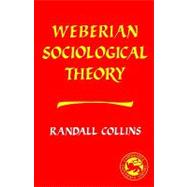
Weberian Sociological Theory
by Randall Collins-

This Item Qualifies for Free Shipping!*
*Excludes marketplace orders.
Buy New
Rent Textbook
Used Textbook
We're Sorry
Sold Out
eTextbook
We're Sorry
Not Available
How Marketplace Works:
- This item is offered by an independent seller and not shipped from our warehouse
- Item details like edition and cover design may differ from our description; see seller's comments before ordering.
- Sellers much confirm and ship within two business days; otherwise, the order will be cancelled and refunded.
- Marketplace purchases cannot be returned to eCampus.com. Contact the seller directly for inquiries; if no response within two days, contact customer service.
- Additional shipping costs apply to Marketplace purchases. Review shipping costs at checkout.
Summary
Table of Contents
| Preface | |
| 1. Introduction | |
| Part I. Economics: 2. Weber's last theory of capitalism | |
| 3. The Weberian revolution of the High Middle Ages | |
| 4. A theory of technology | |
| 5. Weber and Schumpeter: toward a general sociology of capitalism | |
| Part II. Politics: 6. Imperialism and legitimacy: Weber's theory of politics | |
| 7. Modern technology and geopolitics | |
| 8. The future decline of the Russian Empire | |
| Part III. Culture: 9. Heresy, religious and secular | |
| 10. Alienation as ritual and ideology | |
| Part IV. Sex: 11. Weber's theory of the family | |
| 12. Courtly politics and the status of women | |
| References | |
| Index. |
An electronic version of this book is available through VitalSource.
This book is viewable on PC, Mac, iPhone, iPad, iPod Touch, and most smartphones.
By purchasing, you will be able to view this book online, as well as download it, for the chosen number of days.
Digital License
You are licensing a digital product for a set duration. Durations are set forth in the product description, with "Lifetime" typically meaning five (5) years of online access and permanent download to a supported device. All licenses are non-transferable.
More details can be found here.
A downloadable version of this book is available through the eCampus Reader or compatible Adobe readers.
Applications are available on iOS, Android, PC, Mac, and Windows Mobile platforms.
Please view the compatibility matrix prior to purchase.